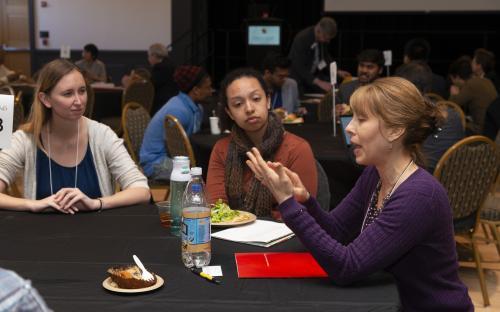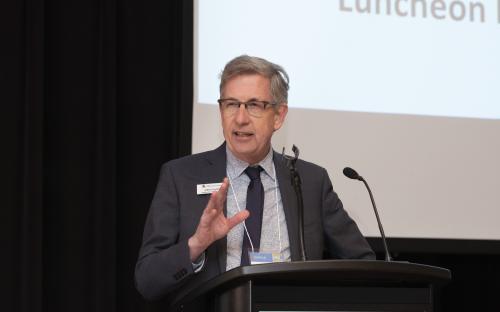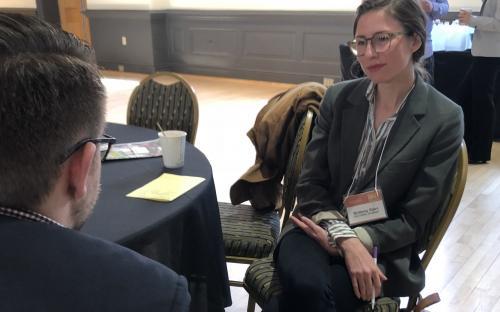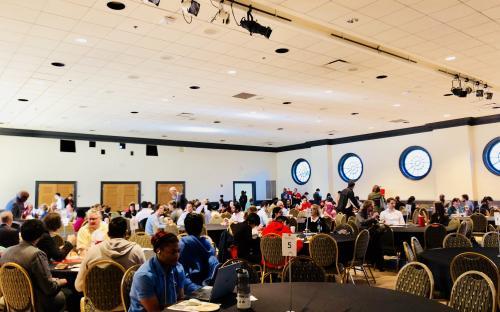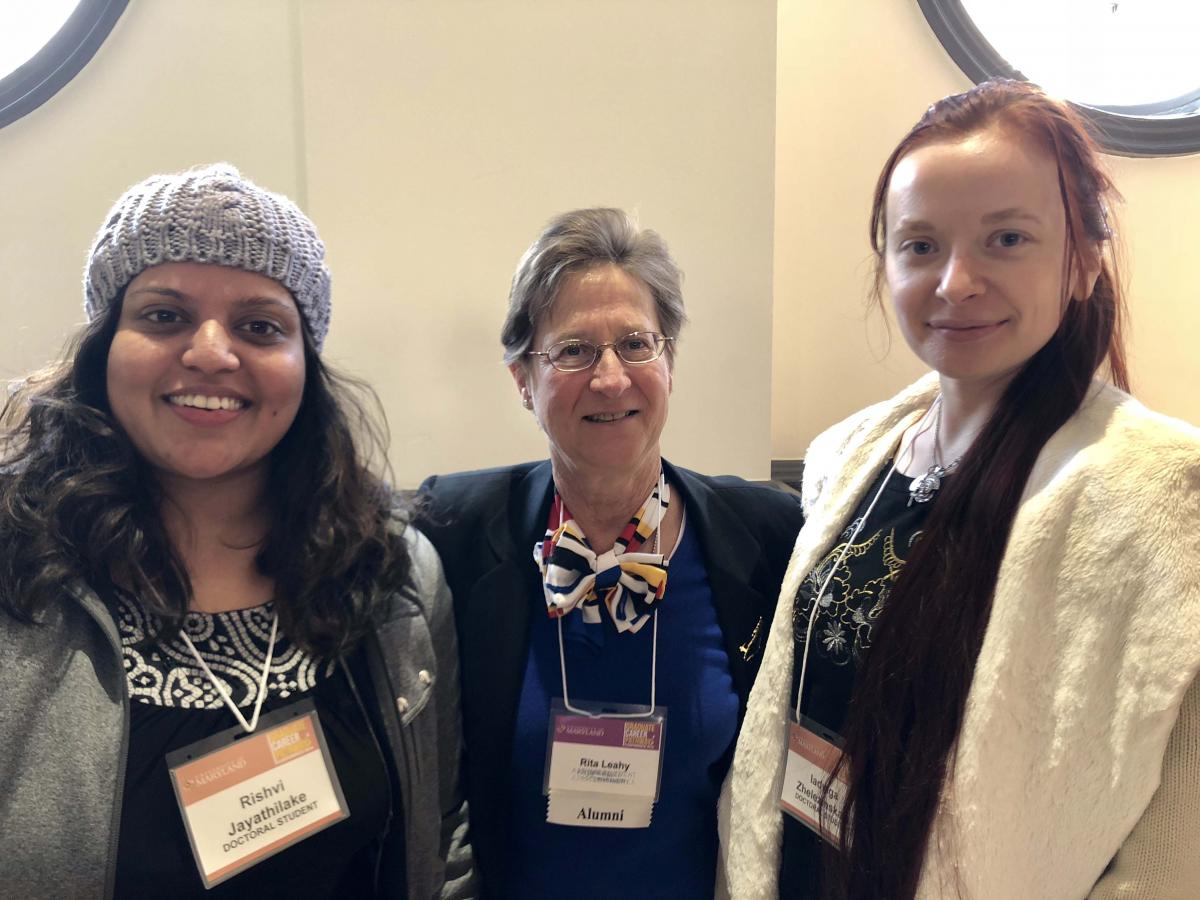 Last Friday marked the first annual Graduate Career Pathways Conference at the University of Maryland. Modeled on a successful event at Stanford, this day-long conference exposed graduate students, and postdocs across disciplines to the wide variety of career paths available to them. In addition to alumni panels, attendees had a chance to network with UMD graduates in the VA/MD/DC area who have gone on to pursue careers in various governmental agencies, the nonprofit sector, healthcare, applied research, education, consulting, and industry.
Last Friday marked the first annual Graduate Career Pathways Conference at the University of Maryland. Modeled on a successful event at Stanford, this day-long conference exposed graduate students, and postdocs across disciplines to the wide variety of career paths available to them. In addition to alumni panels, attendees had a chance to network with UMD graduates in the VA/MD/DC area who have gone on to pursue careers in various governmental agencies, the nonprofit sector, healthcare, applied research, education, consulting, and industry.
"As graduate students, we are regularly exposed to the progression of tasks required to continue a career in academia. This event was a breath of fresh air due to the wide range of participants, and panelists. I have always been curious about the careers in government, and industry labs, and this event provided insight into those opportunities, and beyond. I spoke with other participants across the STEM fields, and they also enjoyed how insightful the speakers' experiences were. I think that this event is a must for any student working towards an advanced degree, and I will recommend it to colleagues in the years to come," observed Leó Torres, Bioengineering doctoral student, and one of 115 attendees at the conference.
"I am not aware of any other University career event that is organized across the campus in such a way as to offer something for all graduate students and postdocs. This was an unprecedented opportunity for our scholars to be exposed to an experience that laid out the menu of options after graduation - where academia is just one of the many possible directions. Having alumni representatives from so many organizations demonstrated that an academic background is truly transferrable to any career path," added Bryan Kempton, Director of Career Services and Alumni Relations at the School of Public Policy.
Indeed, the conference was a collaborative venture between various entities on campus. The planning committee included Dr. Ralph Bauer (ARHU), Beth Floyd (BSOS), Veronica Perrigan (ENGR Career Services), Adria Schwarber (Graduate Student Government), Brad Calvin (ISSS), Dr. Phillip Staniczenko (Postdoc/CMNS), Dr. Nancy Gray Smith and Dr. Sylvette LaTouche-Howard (Public Health), Bryan Kempton (Public Policy), Marissa Stewart (TLTC), Amanda Strausser, Anna De Cheke Qualls, and Mary Carroll-Mason (Graduate School), Alicia Montague, Allynn Powell, Linda Lenoir, and Michelle Watson (University Career Center/The President's Promise), and Dan Christopher (University Relations). Susan Martin (Graduate School/Career Services), and Blessing Enekwe (Graduate School/Office of Postdoctoral Affairs) energetically, and dedicatedly chaired the group.
The morning offered sessions on careers in the nonprofit and governmental sectors, teaching beyond academia, communication and writing, STEM research in industry, public service, and applied research. The afternoon concluded with concurrent panels on scientific/technical career path options, NGOs, policy work and conservation, higher education administration, and workplace diversity. The conversations were rich, participants had a chance to ask a lot of questions, and attendees walked away with food for thought.
In one of the Arts and Humanities sessions, panelists discussed their reasons for attending graduate school, including their plans after graduation, and the ways in which those plans changed and evolved. Attendees asked about how training in the Arts and Humanities has been benefiting the panelists in their current lines of work. "Overall, student attendees were very engaged, and the panel (as well as the conference at large) was very effective in conveying the importance not only of specialized 'hard' skills and knowledge but also of 'soft' skills, such as the construction of a compelling narrative about an applicant's qualifications and employment objectives," observed Dr. Ralph Bauer, Associate Dean for Academic Affairs, in the College of Arts and Humanities.
Dr. Astrid Caldas one of the 45 panelists, and Senior Climate Scientist at the Union of Concerned Scientists, remarked that, "Our panel on policy, conservation, and NGOs was an honest, and candid discussion not only of careers in those fields but also the challenges, and setbacks one can face when pursuing fields outside of academia. We shared practical tips and personal stories of overcoming such barriers. The students were very engaged, and seemed to be drawn by the passion of the members of the 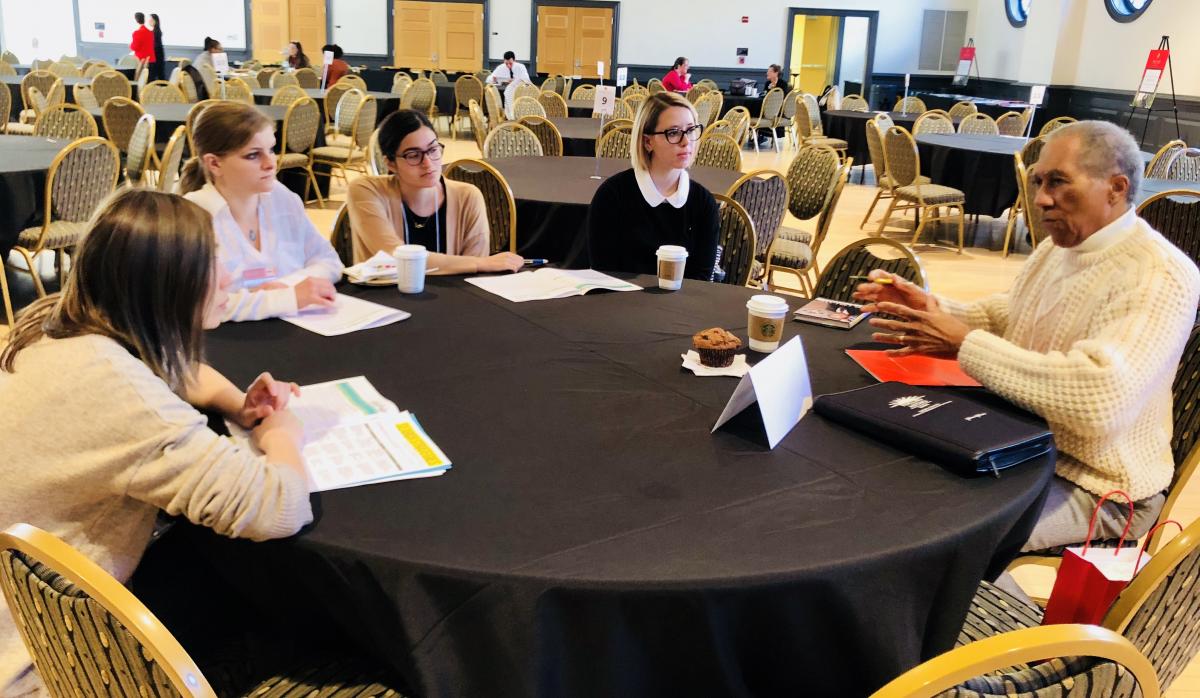 panel when speaking about their career paths. One thing we all agreed upon was the humanity with which we described our work, why we chose it, and what we hoped to accomplish by doing that."
panel when speaking about their career paths. One thing we all agreed upon was the humanity with which we described our work, why we chose it, and what we hoped to accomplish by doing that."
For Jacquelyn Meisel, a postdoc in the Center for Bioinformatics and Computational Biology, the event opened her eyes to some career options she had not previously considered. "One of the messages from this day was the importance of staying open. Yes, having next steps, and developing goals, but also keeping an open mind. In addition, a lot of people talked about marketing your soft skills."
Veronica Perrigan, Assistant Director of Student Services at Engineering's Co-op and Career Services, echoed these sentiments. "It was great to hear speakers talk about having a plan but not being afraid of deviating from them. The idea of being open to serendipity is important. At the same time, this event brought awareness to the idea that academics can research their potential career paths in the same way they conduct research in their field," she said. Juliane Kim, a master's student in English agrees, "The job search process is nuanced. Some people today said they read only cover letters when hiring, other said they only look at resumes. That tells me that we should research potential employers to make sure our materials are as specific to a position as possible."
The day's keynote address, delivered by Dr. Rita Leahy (PhD '89, Civil Engineering), urged graduate students, and postdocs to go beyond their comfort zones. Leahy stressed the importance of networking, flexibility, and soft skills - especially building lasting relationships with others, and practicing the elusive art of active, and empathetic listening. Networking she said, "is an ongoing process that takes time, and nurturing, and not something you do just when you are looking for a job. It’s important to remember that networking is a two-way process in which you provide beneficial support to those in your network." Leahy added, "Soft skills are much harder to measure, and evaluate. Some of the most important soft skills include attitude, communication, flexibility, problem solving, and critical thinking. It’s quite fashionable to say that we live in the 'information age.' But I think that’s not quite right. In truth, we live in a 'communication age,' and it’s critical that we take it seriously."
Rishvi Jayathilake, a doctoral student in Chemistry hailing from Sri Lanka, was inspired by Leahy's words. She is in her final year at Maryland, and came away energized and full of actionable ideas. 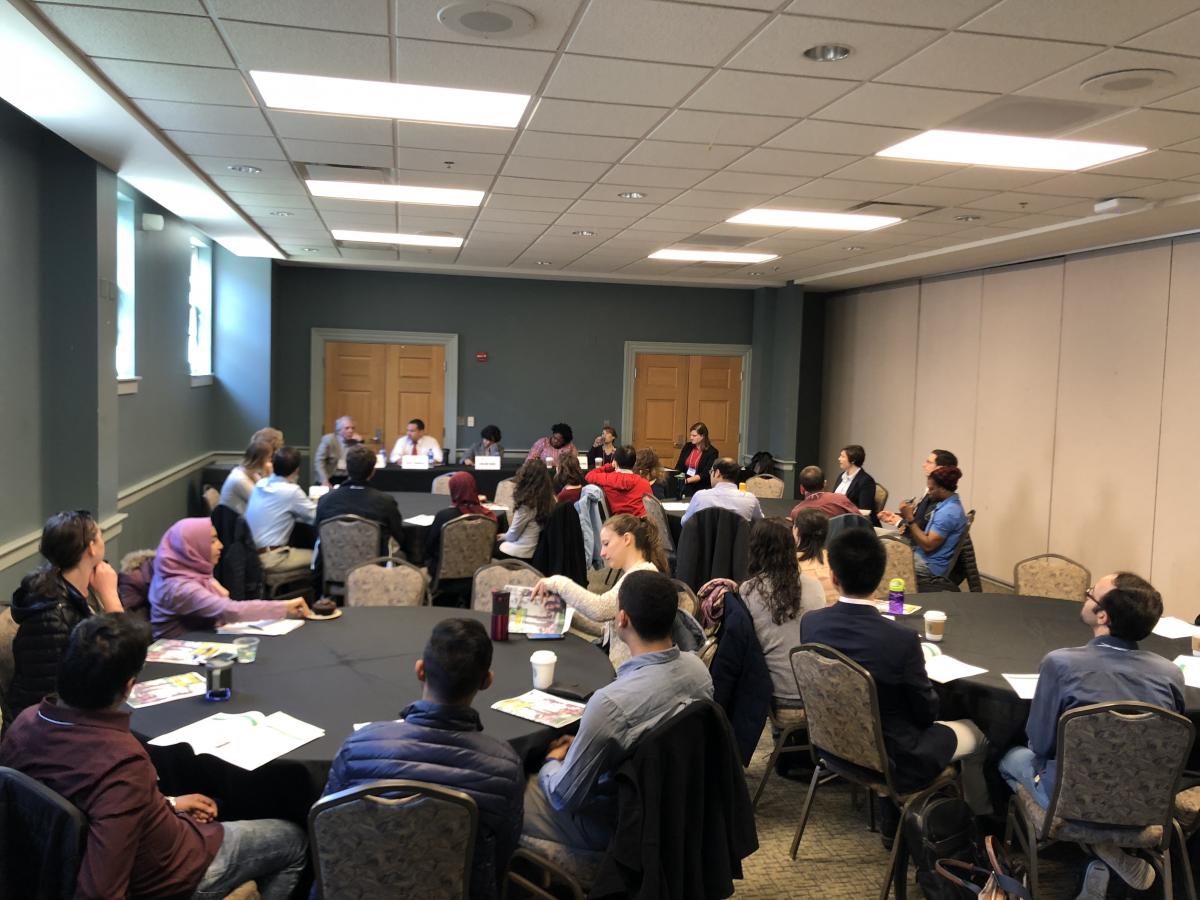 "I was taking copious notes during Dr. Leahy's address, as well as the panels. Before today, I had not heard the expression 'It's not what you know, it's who you know.' First, I am going to paste that statement prominently on my wall. Then I am going to print a lot of business cards, and really network," she said. "I plan to focus on finding a good match for my transferrable skills as I look to a career in industry. It was also reassuring to hear from international alumni, and learn how they navigated the visa process."
"I was taking copious notes during Dr. Leahy's address, as well as the panels. Before today, I had not heard the expression 'It's not what you know, it's who you know.' First, I am going to paste that statement prominently on my wall. Then I am going to print a lot of business cards, and really network," she said. "I plan to focus on finding a good match for my transferrable skills as I look to a career in industry. It was also reassuring to hear from international alumni, and learn how they navigated the visa process."
For further information on the Graduate Careers Pathway Conference, go here.
